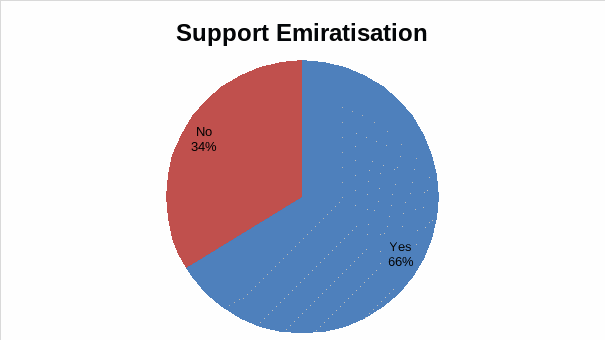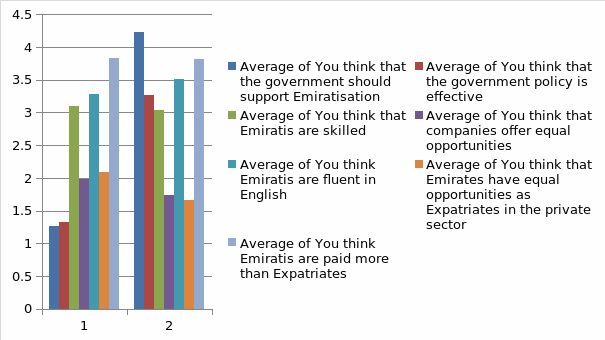Executive Summary
In recent years, there has been a growing trend of nationalization of the job market in Gulf countries, including the United Arab Emirates (U.A.E.). The current study also examines the views and responses of Emiratis and expatriates regarding Emiratisation in the U.A.E. and factors that are affecting its implementation. The study used a quantitative approach to designing the questionnaire and analyzing the data collected from the primary research.
The researcher used convenience sampling for selecting respondents. The results indicate that Emiratis support Emiratisation, and they want their government to continue this strategy. They are also of the view that there are equal job opportunities for them in both the public and private sectors. They also feel that their English skills are weak that could be one of the main barriers for jobs in the private sector. The study concludes that Emirates is in favor of Emiratisation, and expatriates do not want the government to pursue this strategy.
Introduction
The nationalization strategy of Gulf countries is well supported by the citizens of these countries. The government aims to increase the participation of local nationals in the job market. Before the nationalization of job markets, local citizens preferred to work in public organizations. However, the trend is changing as local nationals also seek equal opportunities in the private sector companies (Randeree 2009).
On the other hand, expatriates are concerned about their future, and job opportunities in the Gulf region as companies both in public and private sectors are giving preference to local citizens. Also, expatriates are paid low salaries as compared to local citizens. The current situation is increasing the disparity in the job market, and expatriates are forced to move to other markets. The current study focuses on Emiratisation of the job market in the United Arab of Emirates (U.A.E.).
The current study collects data through primary research. The objective of the study is to gather views of both Emiratis (local nationals) and expatriates regarding the ongoing Emiratisation process and factors that affect its success in the U.A.E. The key factors considered for the current study include the government’s strategy support and effectiveness, skills of Emiratis, equal job opportunities, and salaries (Aljanahi 2016).
Data source and data type
The current study follows a positivist paradigm to carry out quantitative research. The methodology involves the implementation of a survey questionnaire to collect primary data. The primary data comprises of views and responses of individuals working in the U.A.E. The questionnaire is designed with different questions relating to the demographic background of respondents, their support for Emiratisation, and factors affecting Emiratisation in the U.A.E.
The questionnaire was developed by using close-ended questions and statements. The first four questions collect demographic information of respondents, including age, gender, location, and education. The next two questions are related to the current employment status and the job sector in which respondents are presently working. The next question is regarding the support for Emiratisation that is a crucial question as it helps in determining the differences between the overall views of Emiratis and expatriates.
The next seven statements are related to different factors that affect the implementation of Emiratisation. These statements were developed by using the Likert Scale that ranks responses according to the values assigned to them. These factors include the government’s strategy and its effectiveness, skills, and knowledge of Emiratis, job opportunities, and salaries paid by employers in both public and private sectors.
It is important to devise an effective sampling strategy for selecting respondents of the survey. In this study, a convenient sampling technique, which is a non-probability method of selecting a sample, is used. The reason for selecting this strategy was to ensure that both groups of individuals, including Emirates and expatriates, have equal chances of getting selected. The respondents were requested to participate in the survey, and the questionnaire was emailed to them. The respondents completed the questionnaire at their convenience and sent it back to the researcher via email. A key limitation of this method is that the respondents completed the survey in an uncontrolled environment.
Strategies for analysis
It is already indicated that the objective of the study is to compare views of Emiratis and expatriates regarding Emiratisation. Therefore, the analysis provides differences in opinions regarding the support for Emiratisation and factors affecting its implementation. The current study performed descriptives, frequencies, and pivot tables and charts to present findings regarding Emiratisation and factors affecting it. The descriptives include meaning, median, standard deviation, sample variance, kurtosis, and skewness (Wegner 2008). The Likert Scale implemented in the present study is as follows (Brace 2008).
It implies that the mean value close to one indicates that the majority of respondents strongly agree with the statement. On the other hand, the mean value close to one five indicates that the majority of respondents strongly disagree with the statement. The frequency table is prepared to determine the percentage of respondents in favor of Emiratisation. The pivot table performs cross-tabulation of questions regarding the factors affecting Emiratisation based on the citizenship of respondents (Jelen & Alexander 2013). The results are supported by frequency and pivot charts.
Findings
Descriptives
The descriptives conclude that the majority of respondents strongly agree that the government should support Emiratisation and its policy is effective. Moreover, they strongly agree that there are equal opportunities for both Emiratis and expatriates. However, most of the respondents strongly disagree that Emirates has good English skills and they are paid more than expatriates. The table provided below indicates the values of descriptives calculated for different Likert Scale-based statements.
Table 1. Descriptives.
Frequency
The table provided below indicates the percentage of respondents who are in favor of or against Emiratisation.
Table 2. Emiratisation.

Pivot Table
The pivot table provided below indicates averages of responses regarding the factors affecting the implementation of Emiratisation. The results indicate conflicting views of Emiratis and expatriates regarding Emiratisation in the U.A.E.
Table 3. Pivot Table.

Conclusion
The analysis of data provides the following conclusions regarding Emiratisation and factors affecting its implementation.
- The descriptives highlight that Emirates lack good English skills that could be one of the main barriers to Emiratisation.
- The frequency tables and chart indicate that all Emiratis are in favor of Emiratisation, and expatriates do not support it.
- The pivot table indicates conflicting views of Emirates and expatriates regarding Emiratisation and its government’s support. The results concluded that expatriates do not want Emiratisation, and Emirates supports it.
Reflective Summary
The study allowed the researcher to learn and implement quantitative research methods. The quantitative research analyses numerical data collected from an experiment, observation, or survey. In the current study, the researcher conducted primary research by implementing a survey questionnaire. It allowed the researcher to formulate questions to serve the purpose of the study in an objective manner.
Reference List
Aljanahi, MH 2016, ‘Challenges to the Emiratisation process: content analysis’, Human Resource Development International, vol August, pp. 1-8.
Brace, I 2008, Questionnaire Design: How to Plan, Structure and Write Survey Material for Effective Market Research, Kogan Page Publishers, London, UK.
Jelen, B & Alexander, M 2013, Excel 2013 Pivot Table Data Crunching, Que Publishing, Indianapolis, Indiana.
Randeree, K 2009, ‘Strategy, Policy and Practice in the Nationalisation of Human Capital: ‘Project Emiratisation’, Research and Practice in Human Resource Management, vol 17, no. 1, pp. 71-91.
Wegner, T 2008, Applied Business Statistics: Methods and Excel-Based Applications, Juta and Company Ltd. , Cape Town, South Africa.